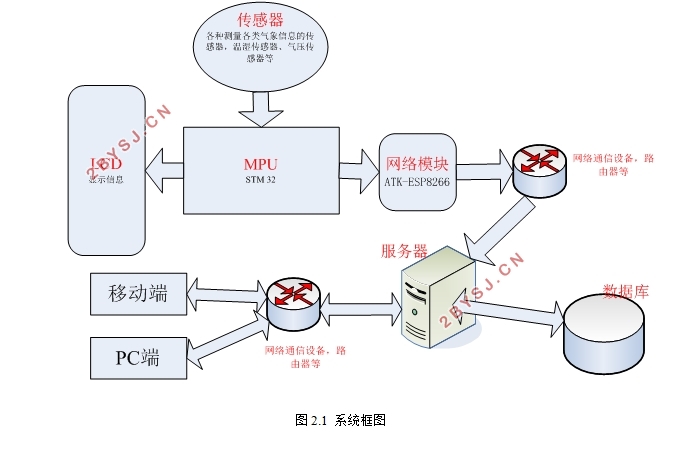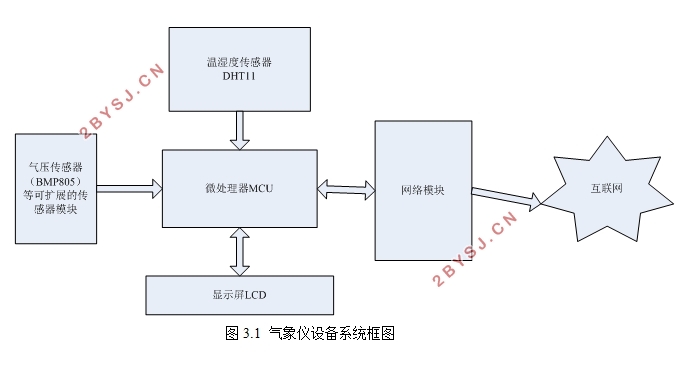基于物联网的简易便携式气象仪设计
无需注册登录,支付后按照提示操作即可获取该资料.
基于物联网的简易便携式气象仪设计(论文13000字)
摘要:物联网是新一代信息技术的重要组成部分,也是“信息化”时代的重要发展阶段。利用局部网络或互联网等通信技术把传感器、控制器、机器、人员和物等通过新的方式联在一起,形成人与物、物与物相联,实现信息化、远程管理控制和智能化的网络。
气象信息与人类的生活息息相关,通过各种设备获取气象信息对于人类来说至关重要。把气象信息采集与物联网结合起来,极大的方便了个人获得气象信息。
本文将介绍一个基于物联网技术的简易便携式气象仪,使用单片机结合各类传感器采集气象信息,并通过网络模块基于UDP协议将采集到的数据上传至服务器的数据库中。然后搭建一个基于B/S模式的系统,使用者可以用过浏览器来访问系统,管理设备以及查看气象信息。
关键词:物联网;气象信息;嵌入式;万维网;用户数据报协议
Design a simple and portable weather instrument which based on Internet of things
Abstract: The Internet is an important part of the new generation of information technology, and it's an important stage in the development of "information" age. Using local network , Internet and other communication technologies to make the sensors, controllers, machines, people and other objects together through a new way .thus forming people and things,objects and objects associated with each other,and then realizing information,remote management and intelligent network.
Meteorological information is closely related to people’s life,It is very important for human to get meteorological information through various of equipment.Combing the meteorological information with network, which greatly facilitate people to obtain weather information.
This article describes a simple and portable weather instrument based on the internet of things technology,using sensors and micro controller collect weather information, and using the network sensor send data to the server which based on UDP,then upload these data to server’s database. And build a system which base on B/S framework. Users can use browser to access the system,manage equipment and query information.
Key word:Internet of Things;Weather Information;Embedded;WEB;UDP


目 录
1.绪论 3
1.1 设计目的和意义 3
1.2 气象仪器发展简介 3
1.3 本文结构与内容分布 4
2. 设计需求分析 4
2.1 概述 4
2.2 系统框图 4
2.3 需求分析 5
3. 气象仪设计 6
3.1 设计方案 6
3.2 核心模块介绍 6
3.2.1 STM32F103RCT6芯片 6
3.2.2 温湿度传感器 7
3.2.3 气压传感器 7
3.2.4 WIFI模块 8
3.3 设计内容 8
3.3.1 网络连接 8
3.3.2 传感器采集信息 9
3.3.3 发送信息 9
3.4 系统测试 10
4. 信息采集系统设计 10
4.1设计方案 11
4.2 相关技术介绍 11
4.2.1 TCP协议与UDP协议 11
4.2.2 DBCP数据连接池 11
4.2.3 多线程 11
4.3 设计内容 12
4.3.1 流程图 12
4.3.2 功能实现 12
4.4 系统调试 13
5. 气象仪管理系统设计 14
5.1 设计方案 14
5.2 核心技术介绍 15
5.2.1 SSM框架 15
5.2.2 MySQL数据库 15
5.2.3 Tomcat服务器 15
5.3 设计内容 16
5.3.1 流程图 16
5.3.2 系统数据库设计 16
5.3.3 功能实现 19
5.4 核心代码示例 23
6. 总结 24
参考文献: 25
致谢 26
